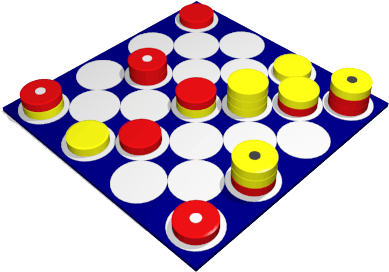About Lasca
News - Fool's Mate
January 2013: Lambert Hergesell and Detlef Steuer have found a shorter fool's mate; see Fool's Mate.
LASCA, sometimes called Laskers or Laska, is a very intriguing and exciting board game invented in 1911 by the great chess master Emanuel Lasker. At first sight the game resembles draughts (called checkers in the USA); it is played with draughts pieces on a chequered board, and the pieces move like draughtsmen.
However, the similarity ends there, and as the game proceeds the soldiers, as they are called, become stacked into columns, sometimes containing the other player’s soldiers as prisoners underneath. Soldiers are promoted to officers, or are captured, and soon a violent battle rages on the board, with many possibilities for subtle strategies and tactics:
Despite the game’s unique features it seems to have remained relatively obscure, and it is certainly very surprising that Lasca has not taken its place alongside the other great abstract board games.
Origin
Emanuel Lasker was born on Christmas Eve in 1868. in Berlinchen, Germany. He studied mathematics at university, though his interests included philosophy, the natural sciences, and games playing. He is perhaps best remembered for his brilliant and original chess, and in 1894 he took the title of world champion from Wilhelm Steinitz. He defended the title for an astounding 27 years until 1921 when José Raúl Capablanca dethroned him.
As well as the books he published on chess[1] he also wrote some less well known books on board games[2] and card games, and in his spare time was a keen lawn tennis player. It was during his reign as world chess champion that he invented the game he called Lasca, and it is described in a booklet published in 1911 entitled 'The Rules of Lasca, the Great Military Game'. The rules have since been reproduced in a few collections of games, though some incorrectly attribute the game to Eduard (or Edward) Lasker, who has written several books on chess and Go.

